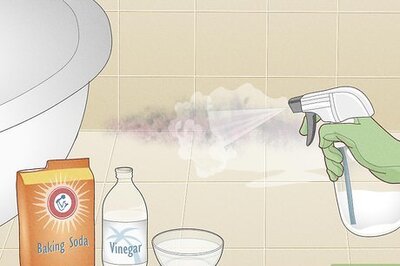
views
For many years, it has been a biannual occurrence in my house to witness my parents observing Navratri fasts, despite dealing with fluctuating glucose levels. They remain steadfast in their religious devotion, choosing to disregard any counsel suggesting they should abstain from fasting due to health concerns.
My objection is not against fasting itself, but against the Navratra form of fasting where one isn’t truly abstaining from eating and, in fact, ends up consuming extremely unhealthy and inappropriate foods.
At first, I believed it to be a unique occurrence in my house, where my parents would often become unwell either after or during fasting. But then, I spoke to experts to understand they have similar experiences.
Dr Ashok Kumar Jhingan, a senior director at Centre For Diabetes, Thyroid, Obesity & Endocrinology, BLK-Max Super Speciality Hospital, told me that he knows more elderly similar to my parents. He knows several aged people, who, due to the tradition of fasting, are into the habit of observing these fasts, but end up falling ill due to unhealthy food options.
In fact, Dr Anoop Misra, the chairman of Fortis C-Doc Hospital for Diabetes and Allied Sciences, encounters a significant increase in patients visiting his clinic due to Navratri fasting-related health emergencies.
While there are many food items that can be considered unhealthy, in many Indian households during Navratri fasts, potatoes take centre stage, starring in various forms like chips, sabzi, dough, and snacks.
A Cup of Potato is Equal to a Can of Cola
Potatoes are not the sole culprits in unhealthy or fasting diets; there are numerous other food items and preparations that also play a role such as deep-fried snacks, ghee-rich dishes, store-bought namkeen mixes, and starchy high-carb foods.
However, potatoes are often not perceived as unhealthy, despite their less-than-ideal nutritional profile.
Harvard’s Healthy Eating Plate does not classify potatoes as a ‘vegetable’ due to their high content of rapidly digested carbohydrates, which can lead to spikes in blood sugar and insulin levels.
According to Harvard TH Chan School of Public Health, a cup of potatoes has a similar effect on blood sugar as a can of cola or a handful of jelly beans.
Take a moment to introspect – how many potatoes have you consumed in the past 10 days?
While India is grappling with the ongoing epidemic of lifestyle-related non-communicable diseases, leading to death of over 50 lakh Indians annually, medical experts say that during festive seasons, there is a noticeable surge in the prevalence of diabetes and lifestyle-related illnesses.
Dr Ashutosh Shukla, medical advisor and senior director, internal medicine, Max Hospital, Gurugram, told News18 that such dietary patterns in the name of fasting and festivities lead to the “onset of diabetes” in some people.
“In the present-day context, especially post-pandemic with the overall stress levels high, people with a genetic predisposition for diabetes, who consume more fasting food, especially unhealthy food items like potatoes and other fried food, are more likely to have new-onset diabetes.”
What’s With Potatoes?
A 2011 study published in the New England Journal of Medicine, which followed the dietary and lifestyle patterns of 1.2 lakh individuals for up to 20 years, found that those who incorporated more French Fries and baked or mashed potatoes into their diets experienced increased weight gain, amounting to an additional 1.5 kg and 590 grams every four years, respectively.
The study said that the four-year weight change was most strongly associated with the intake of potato chips and potatoes followed by sugar-sweetened beverages, unprocessed red meats, and processed meats.
Similarly, the latest study published in BMJ — a peer-reviewed medical journal published by the British Medical Association — finds a linkage between changes in carbohydrate intake and long-term weight changes.
It said that replacing low-quality carbohydrate food such as potatoes in favour of high-quality food items could support efforts to control weight gain.
Not only weight gain, but potatoes have the potential to increase other risk factors. For instance, a large pan-European study provided robust additional support for the hypothesis that a diet that induces a high glucose response is associated with greater coronary heart disease risk.
Back in 2006, a large study found a positive association between the consumption of potatoes and the risk of type 2 diabetes in women.
Over the long term, diets high in potatoes can contribute to obesity, diabetes, and heart disease.
High Blood Sugar Levels & Patient Influx
The more than dozen doctors I spoke to were in agreement that they end up seeing many more patients than usual during and after fasting season.
Blame the unscientific and unhealthy way of fasting which includes the consumption of deep-fried fritters, chips, ghee-laden preparations, market-ready namkeen mixtures, high in starch and carbohydrate food items.
Dr Hridish Narayan Chakravarti, consultant, diabetology and endocrinology at NH RN Tagore Hospital, undertakes four to five consultations every day during the Navratri season, generally of people below 50 years of age.
“Consuming excessive potatoes and sugary items, along with fried foods leads to a spike in blood sugar levels,” he suggested, advising diabetics that if they are on insulin or oral sugar medications and fasting, these doses might need to be adjusted on the advice of your doctor. “Otherwise, sugars may be too high or too low.”
Dr Arun Kumar C Singh, director, endocrinology and diabetology, at Metro Hospital, Faridabad, said: “Many people come to us in our OPD with complaints of high blood sugar levels due to this festive season… Navratri season is extremely crucial for people with diabetes. They are at higher risk of sugar levels going out of control high range because of bad food choices and sugar going too low which can be harmful because of long fasts.”
Singh said that the major rise in such patients is not seen immediately during the festive season, but is mostly seen after these festivals are over, such as after a few days of Navratri.
Overall, the science behind fasting is aimed at promoting the detoxification of the body as the Navratri season comes twice in a year, at the juncture of season change – from spring to summer and autumn to winter.
Experts believe that fasting allows the gut to cleanse and relax the digestive system. Due to this seasonal change, immunity is expected to decline and hence, a line of light-weight but healthy food is generally designed for the fasting period which includes fruits, nuts, milk, and vegetables among other healthy food items.
The divine presence resides within our own healthy bodies. For those who are already battling an illness, caring for the human body transcends fasting. In fact, taking care of your body is an act of devotion in itself.


















Comments
0 comment